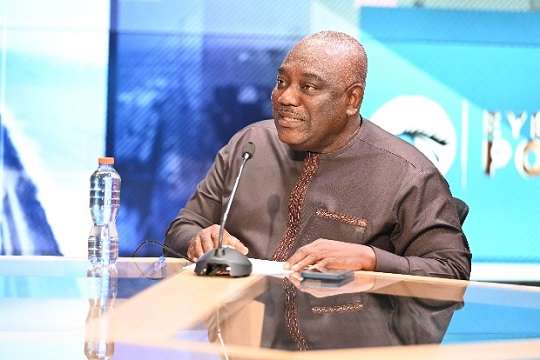Recent reports spun tales of Ghana’s cargo slipping away to neighboring shores. Yet, amidst the swirling claims, Ghana Revenue Authority’s Customs division has refuted rumors suggesting that Ghana is losing transit cargo to neighboring countries like Togo and Ivory Coast.
In a twist of abracadabra, GRA’s reassurances seemingly challenge the narrative, shedding light on the steadfast resilience of Ghana’s transit trade.
In an interaction, Gerald Agbettor, Chief Revenue Officer and Officer in Charge of Transit at the Customs division of GRA clarified that Ghana is not experiencing losses in transit cargo as claimed.
Agbettor pointed to custom declaration data indicating a growth in the volume of transit trade within the country.
He highlighted that from January to March 2024, there was a significant increase in transit trade, with the volume rising by 136,000 metric tons compared to the same period in 2023.
Specifically, the transit trade volume surged from 308,000,000 metric tons in 2023 to 444,000,000 metric tons in 2024.
“Some time ago, I joined the chorus, especially transit business from the ports to the hinterlands, they say that Ghana is losing the transit trade to other places. By my background, I was able to have access to the data manifest and when I went through it, I saw transshipment to Benin, and transshipment to Togo, and it became alarming. But the fact that it is transshipment on the manifest to Togo and Benin does not mean we are losing transit trade to them.”
Gerald Agbettor

Mr. Agbettor also revealed that the rate of diversion in Ghana is minimal. Nevertheless, he emphasized the importance of enhancing security measures at ports and transit terminals to promote fair trade.
Moreover, he praised the Ghana Ports and Harbours Authority for their collaboration in assisting the Customs division of GRA in saving GH¢90 million. This significant cost reduction resulted from targeted initiatives aimed at lowering diversion rates at the port.
Eric Adiamah, a Council member of the Ghana Institute of Freight Forwarders (GIFF) concurred with the Chief Revenue Officer, affirming that transit operations in Ghana were flourishing.
“Transit business is thriving well. The only problem we see as operators of transit business is the cost of doing the business. The volumes as my brother has said are from data I have no access to, but on the ground what we know is that we are losing some volumes to neighboring countries like Lomé. Meanwhile, between Togo port and Tema port, when it comes to security and quality of service, the port of Tema is way ahead.”
Eric Adiamah
Mr. Adiamah expressed confidence in the adequacy of the regulations governing transit trade to effectively manage the diversion of transit cargo at ports.

He encouraged the GRA Customs division to strengthen its collaborative efforts with freight forwarders to deter their involvement in transit diversion activities.
To serve as a deterrent to potential offenders, he emphasized the importance of ensuring that individuals apprehended for transit diversion offenses face the full consequences of the law.
The Officer in charge of transit stated that section 95, ACT 891, 2015, (6) of the Customs Act allowed for escorts for high-risk goods under transit when the Commissioner deems it so.
“There were suspicions that some high-risk goods were likely to be diverted and because of that, we have to place escorts on them. So, it is not the entirety of the whole transit trade.”
Eric Adiamah
Issues With GRA’s Defense
The analysis provided by Mr. Agbettor presents several compelling points, but it may still leave room for skepticism for a few reasons.
First, while the data provided shows an increase in transit trade volume, it doesn’t necessarily address the concerns about potential diversion of cargo to neighboring countries comprehensively.
Mr. Agbettor focuses primarily on the overall growth in transit trade without delving into specific measures or evidence to counteract claims of cargo diversion.
Early April 2024, the Importers and Exporters Association of Ghana raised concerns over the country’s loss of port traffic from the Tema Port to the Lomé Port in Togo.
The Association stated that while Tema Port’s traffic has increased, it has not been growing as rapidly as Lomé’s Port, which has seen a significant increase from 300,000 thousand containers per annum in the early 2000s to 1.5 million containers currently.
In comparison, the Tema Port has experienced similar growth, expanding from a comparable capacity in the early 2000s to handling 1.2 million containers at present.
Dr George vanDyck, the lead researcher on governance, port clusters, and competitiveness within the Tema Ports emphasized the position of the Importers and Exporters Association of Ghana.
“Ghana which was quite predominant in the early 2000s is now doing 1.2 million, it’s going up but not as fast as Togo is going up. So there’s a lot of competition. What do we have to do? People are saying we are leaving trade to Togo, yes, it’s about creating an enabling business environment.”
Dr George vanDyck
While the GRA representative acknowledges that security should be tightened at ports and transit terminals and that some volumes of transit may be lost due to regulations and high costs, there’s a gap in addressing how these challenges are being effectively tackled.
Although the Chief Revenue Officer asserts that Ghana is not losing transit cargo, Mr. Adiamah contradicted this claim by stating that some volumes are indeed being lost to neighboring countries like Togo.
The focus shouldn’t be on whether Ghana is losing cargo to neighbors but rather on the fact that Togo is currently handling 1.5 million while Ghana is handling 1.2 million. This fact suggests that Ghana must enhance its operations to regain dominance which would in turn boost its economic prospects.
READ ALSO: Professor Naana Jane Outlines NDC’s Vision for a Transformed Ghana





















